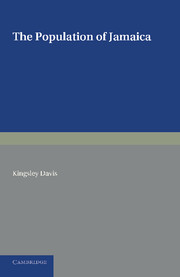Book contents
- Frontmatter
- The Conservation Foundation
- Contents
- List of Figures
- List of Tables
- Preface
- INTRODUCTION
- CHAPTER 1 DEMOGRAPHIC MATERIAL AVAILABLE
- CHAPTER 2 GROWTH OF THE POPULATION
- CHAPTER 3 MAJOR CHARACTERISTICS OF THE POPULATION
- CHAPTER 4 CURRENTS OF EXTERNAL MIGRATION
- CHAPTER 5 INTERNAL MIGRATION
- CHAPTER 6 MORTALITY
- CHAPTER 7 CHANGING PATTERNS OF REPRODUCTION
- CHAPTER 8 FERTILITY, MATING AND ILLEGITIMACY
- CHAPTER 9 GROWTH PROSPECTS
- APPENDICES
- Index of Names
- Index of Subjects
CHAPTER 1 - DEMOGRAPHIC MATERIAL AVAILABLE
Published online by Cambridge University Press: 05 June 2016
- Frontmatter
- The Conservation Foundation
- Contents
- List of Figures
- List of Tables
- Preface
- INTRODUCTION
- CHAPTER 1 DEMOGRAPHIC MATERIAL AVAILABLE
- CHAPTER 2 GROWTH OF THE POPULATION
- CHAPTER 3 MAJOR CHARACTERISTICS OF THE POPULATION
- CHAPTER 4 CURRENTS OF EXTERNAL MIGRATION
- CHAPTER 5 INTERNAL MIGRATION
- CHAPTER 6 MORTALITY
- CHAPTER 7 CHANGING PATTERNS OF REPRODUCTION
- CHAPTER 8 FERTILITY, MATING AND ILLEGITIMACY
- CHAPTER 9 GROWTH PROSPECTS
- APPENDICES
- Index of Names
- Index of Subjects
Summary
THE DEVELOPMENT OF THE DEMOGRAPHIC RECORDS
‘The Blue Books of Jamaica are the worst returns in the Colonial Office; there is a slovenliness… manifest in every document …. It is to be hoped that the authorities of Jamaica will in future pay more attention to the important subject of statistics.’ In these words the eminent statistician R. M. Martin summed up the data on Jamaica at his disposal just before the first census of the island was taken. These strictures are no longer true. During the century since Martin wrote, a body of fairly reliable demographic data has been built up, and its steady development and its reliability are surveyed in this chapter.
The inauguration of census-taking in Jamaica and the establishment of an efficient system of civil registration throughout the island were not the result of administrative decisions taken in Jamaica as distinct from the other territories of the West Indies. In fact, both census-taking and civil registration had their origin largely in the policy of the British Government in respect of the West Indies as a whole. There was no comparable policy aimed at developing a uniform system of recording migration in general, but the central direction exercised over indenture migration still assured, through the numerous controlling laws it introduced, the development of a uniform and reliable system of recording indenture migration. Consequently the origin and expansion of the demographic records of the island are here treated in the broader context of the initiation of such records throughout the British Caribbean.
Censuses. The records of the West Indies are rich in population estimates and these have been widely quoted by historians of the region. Such is the wealth of these that E. B. Burley has been able to collect upwards of fifty estimates of the population of Barbados between the date of the first settlement and 1844 when the first censuses of the British West Indies were organized.
- Type
- Chapter
- Information
- The Population of Jamaica , pp. 1 - 28Publisher: Cambridge University PressPrint publication year: 2013



